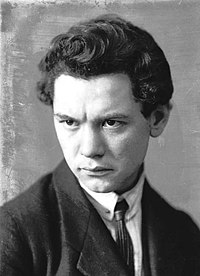Viktor Chalyar
This article is incomplete because it is pending further input from participants, or it is a work-in-progress by one author. Please comment on this article's talk page to share your input, comments and questions. Note: To contribute to this article, you may need to seek help from the author(s) of this page. |
Viktor Chalyar | |
|---|---|
 Official portrait of Chalyar, 1917 | |
| Chief Secretary of the Central Committee of the Revolutionary Nerotysian Communist Party | |
| In office 27 October 1917 – 12 December 1922 | |
| Preceded by | None (Office created) |
| Succeeded by | Mátyás Lynszk |
| Secretary for Style of the Central Committee of the Revolutionary Nerotysian Communist Party | |
| In office 2 February 1918 – 19 November 1922 | |
| Preceded by | None (Office created) |
| Succeeded by | Alexander Lakatos |
| Secretary for Peace of the Central Committee of the Revolutionary Nerotysian Communist Party | |
| In office 28 October 1917 – 19 November 1922 | |
| Preceded by | None (Office created) |
| Succeeded by | Filip Kyrestesz |
| Personal details | |
| Born | 3rd January, 1896 Shynka, Nerotysia |
| Died | 12 December, 1922 Shynka, Nerotysia |
| Nationality | Nerotysian |
| Political party | Revolutionary Nerotysian Communist Party (1917 - 1922) Peninsular Socialist Revolutionary Party (1915-1917) |
| Profession | Revolutionary, Politician |
Viktor Chalyar (3 January 1896 - 12 December 1922) was a Nerotysian Marxist revolutionary, political theorist, and politician. He founded the Revolutionary Nerotysian Communist Party in 1917 out of the Volnik faction of the Peninsular Socialist Revolutionary Party, and went on to lead his party to victory in the Nerotysian Revolution. He served as Chairperson and Secretary for Style within the party, playing a leading role in writing both the party's Statute and the Constitution of Nerotysia. A staunch Marxist, he developed the political theories known as Chalyism.
He was born to a middle-class family in Shynka in 1896, and his parents sent him to a prestigious secondary school in Tihaly, though it nearly bankrupted the family. He excelled in class and was later accepted into the Tagezhima Institute in Shynka, where he struck up a friendship with fellow Marxist Mátyás Lynszk, who had been an agitator on campus for more than two years. He was expelled in 1914 along with Lynszk and Aleksander Enkolić, and the three were banished from the peninsula for their activities. They went to Meriad and joined the Peninsular Socialist Revolutionary Party, and began writing for both mainstream newspapers and underground revolutionary publications. Chalyar had already split with most leading Marxists by the time he started college - in Meriad, he slowly developed an alternative Marxism and spread his new ideas through his writing. He proved to be an effective popular writer, and his ideas took hold in the Marxist wing of the PSRP - by 1917, he had emerged as the leader of the Volniks, a faction which came to dominate the party alongside rival Praksiyaks and Omili. He then engineered the formation of the Revolutionary Nerotysian Communist Party, formalizing the split between the Volniks and the rest of the PSRP.
He and his party returned to Nerotysia after 1917 and oversaw a rapid increase in the popularity of the RNCP. Chalyar wrote prolifically, both theory and propaganda, and the party's Secretariat widely dispersed these writings across the peninsula. In 1921 Lynszk led the party's Scarlet Guard militia to overthrow Kolish rule in Shynka, sparking the Nerotysian Revolution. Chalyar set to work crafting a revolutionary new state, and though he faced fierce opposition from his former friend Enkolić, Nerotysia's new Constitution largely followed Chalyar's ideas about the architecture and function of a revolutionary socialist state. Mainly, he established the absolute rule of the Volnik party and designed an executive Directory which would enforce the party's wishes, expressed through the rubber stamp of a People's Assembly. Chalyar's popularity kept growing throughout the revolutionary war, and he was expected to lead the new Nerotysian state when the Volniks' victory became assured - however, he was assassinated by agents of the Kolish Empire in 1922, before the country had even finished conquering it's current borders.
Despite his short life, Chalyar is widely considered to be one of the most significant and influential figures of the 20th century. After his death, he became the subject of a posthumous personality cult in Nerotysia, becoming a symbol of Nerotysian vigor and temper, and his assassination especially became a symbol of bourgeois oppression. His life and legend became the model for the RNCP's propaganda campaign after independence, emphasizing working-class heroes fighting for the socialist cause. He is the ideological father of Marxism-Chalyism and thus still exerts much influence over the international communist movement, despite remaining a controversial and divisive figure in both left- and right-wing circles.